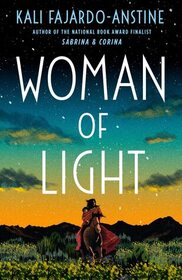Another Source of Light
âWoman of Lightâ starts off like a dream, an ancient fable. It is nighttime in the American Southwest, the Lost Territory in 1868, and â...the sky was so filled with stars it seemed they hummed.â A baby, Pidre, is abandoned in a Moses-like passage and is rescued and raised by Desiderya Lopez, the Sleepy Prophet of the tiny pueblo, Pardona. These are the opening pages of a magical journey through generations of an Indigenous Chicano family.
We shift back and forth in time, but the novel's core revolves around events sixty years later.
Luz âLittle Lightâ Lopez is Pidre's descendent, a young tea leaf reader and clairvoyant in Denver in 1933. She and her cousin Lizette work taking in laundry to make ends meet, although they are looking for more substantial income. Luz lives with their aunt Maria Josie, a remarkably strong woman who never hesitates to confront head-on the harsh realities life deals to her family.
There is an openly hostile atmosphere of prejudice and discrimination the family has to suffer with. Luz is blatantly refused the opportunity to even apply for one job in a white community. Her brother, Diego, makes the mistake of falling in love with the wrong white girl and is beaten badly. After Maria Josie decides she must evict him he flees town altogether.
Most of the men in this book are ineffectual and weak, others just brutal. Luz exhibits questionable taste in men, partially because her goal is to find a man who will protect her from other men. Pidre shows promise as a character in the beginning of the book, but is soon overshadowed by his wife, the sharpshooter Simodecea Salazar-Smith. Bold women are the backbone of this family's story, from the Sleepy Prophet Desiderya to Simodecea to Maria Josie. Luz should be a stronger characterâ she is descended from such remarkable women and pales in comparison. She is a tea leaf reader, she has visions, and yet her inconsistent resolve ensures she remains overshadowed by her legacy.
Life out west in this era was tough and finding accounts are hard if centering on anyone but a white man. Locating the story emanating from a female's point of view, and that of a Native American or Latinx familyâ that is where Kali-Fajardo Anstine has given us a gift.
I received an advance review copy for free, and I am leaving this review voluntarily.
âWoman of Lightâ starts off like a dream, an ancient fable. It is nighttime in the American Southwest, the Lost Territory in 1868, and â...the sky was so filled with stars it seemed they hummed.â A baby, Pidre, is abandoned in a Moses-like passage and is rescued and raised by Desiderya Lopez, the Sleepy Prophet of the tiny pueblo, Pardona. These are the opening pages of a magical journey through generations of an Indigenous Chicano family.
We shift back and forth in time, but the novel's core revolves around events sixty years later.
Luz âLittle Lightâ Lopez is Pidre's descendent, a young tea leaf reader and clairvoyant in Denver in 1933. She and her cousin Lizette work taking in laundry to make ends meet, although they are looking for more substantial income. Luz lives with their aunt Maria Josie, a remarkably strong woman who never hesitates to confront head-on the harsh realities life deals to her family.
There is an openly hostile atmosphere of prejudice and discrimination the family has to suffer with. Luz is blatantly refused the opportunity to even apply for one job in a white community. Her brother, Diego, makes the mistake of falling in love with the wrong white girl and is beaten badly. After Maria Josie decides she must evict him he flees town altogether.
Most of the men in this book are ineffectual and weak, others just brutal. Luz exhibits questionable taste in men, partially because her goal is to find a man who will protect her from other men. Pidre shows promise as a character in the beginning of the book, but is soon overshadowed by his wife, the sharpshooter Simodecea Salazar-Smith. Bold women are the backbone of this family's story, from the Sleepy Prophet Desiderya to Simodecea to Maria Josie. Luz should be a stronger characterâ she is descended from such remarkable women and pales in comparison. She is a tea leaf reader, she has visions, and yet her inconsistent resolve ensures she remains overshadowed by her legacy.
Life out west in this era was tough and finding accounts are hard if centering on anyone but a white man. Locating the story emanating from a female's point of view, and that of a Native American or Latinx familyâ that is where Kali-Fajardo Anstine has given us a gift.
I received an advance review copy for free, and I am leaving this review voluntarily.




